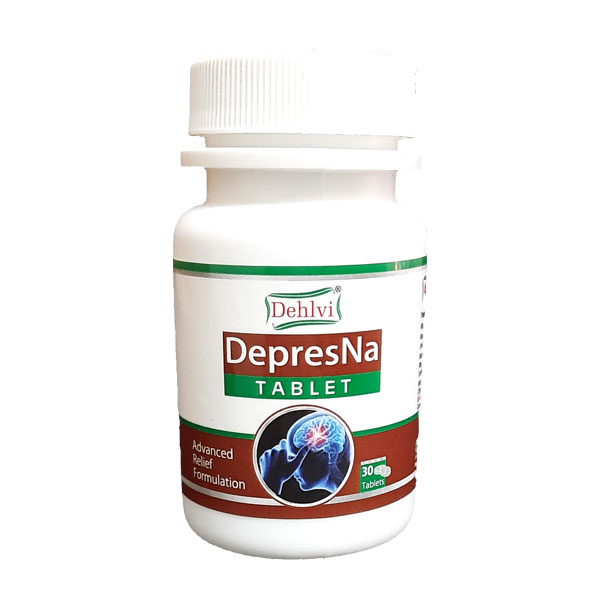
Among the lifestyle disorders, Depression seems to be on top and found affecting more people today than say 2 -3 decades ago, involving all age groups and socioeconomic backgrounds. Depression is as twice as common in women as in men. Half of the sufferers of depression have a hereditary tendency background. It affects both, the patient and the people around the patient. Depression can be brought about by a number of physical and chemical influences, and severely affects an individual’s well-being and ability to function productively. Depression is defined as a psychoneurotic or psychotic disorder marked especially by sadness, inactivity, difficulty in thinking and concentration.
A significant increase or decrease in appetite and time spent sleeping, decrease in sexual drive, feelings of dejection and hopelessness and sometimes suicidal tendencies are some other indication of depression. DepresNa is an herbal mix that helps removing a feeling of depression, anxiety, apathy, sleep disturbances, insomnia, anorexia, and worthlessness. It also induces calmness, reduces hyper sensitivity, enhances mood & wellbeing and increases sociability, reduces pain, fatigue and also improves alertness. Having no side effect, DepresNa is more effective than any other antidepressants due to its balanced herbal combination.
Composition:
Each 500 mg Tablet contains extracts of Glycyrrhiza glabra (Mulethi) 50 mg, Melissa parviflora (Billi Lotan) 50 mg, Valeriana wallichii (Tagar) 50 mg, Nardostachys jatamansi (Balcharr) 50 mg, Withania somnifera (Ashwagandha) 75 mg, Lavandula stoechas (Dharu) 100 mg, Mucuna pruriens (Konch) 125 mg
Indication:
Depression, anxiety associated with depressive symptoms, mood disturbances, depression with insomnia, recurrent depression, maniac depressive psychosis in depressive phase and obsessive thoughts.
Contraindications & side effects:
Not to be taken during pregnancy and lactation. Can induce Excessive sleep.
Dosage:
1 or 2 capsules twice daily after meals with water. Continue symptoms remain and peter down dosage as symptoms subside. Continuation of treatment even after recovery is recommended. Do not exceed from recommended dosage.
Dietary advice:
Avoid coffee, sugar, alcohol, and dairy products. Depression has been associated with a high intake of caffeine. If you drink four or more cups of coffee in a given day, try substituting decaffeinated coffee and soft drinks. Avoid any processed food, artificial colors, stimulant food, canned food, smoking, meats, eggs, and fish. Limit your total daily fat intake to 30 percent of your total calories. Try not to consume more than 300 milligrams of cholesterol a day. Oatmeal, porridge, basil and beetroots are known to have antidepressant qualities. Take small but regular meals. Regular exercise can help relieve moderate depression by triggering natural mood -enhancing chemicals.